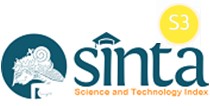Perencanaan kolaboratif dalam penyediaan air bersih di masa pandemi Covid-19 (Studi kasus Kecamatan Batununggal, Kota Bandung)
Abstract
Keywords
Full Text:
PDFReferences
[1] UN-Habitat. Key messages on Covid-19 and informal settlements 2020:1–2.
[2] Pemkot Bandung. RP2PKP. Bandung: 2019.
[3] Nurdiansyah A. Urban Slum Upgrading Policy In Jakarta (Case Study: Kampung Deret Program Implementation). Indones J Plan Dev 2018;3:19–31. https://doi.org/10.14710/ijpd.3.1.19-31.
[4] Indonesia Krisis Air Pada 2025 n.d. https://airkami.id/forum-air-dunia-indonesia-krisis-air-pada-2025/ (accessed January 27, 2022).
[5] Disperkim Jabar. Komunikasi Personal 2021.
[6] Healey P. Collaborative Planning: Shaping Places in Fragmented Societies. Hampshire: Macmillan Press Ltd; 1997.
[7] Okitasari M, Kidokoro T. Understanding Collaborative Governance in Decentralizing Indonesia : A Dimensional Approach to Emerging Intergovernmental and Cross-sectoral Collaboration. Urban Reg Plan Rev 2014;1:82–98.
[8] Boonstra B, Boelens L. Self-organization in urban development: Towards a new perspective on spatial planning. Urban Res Pract 2011;4:99–122. https://doi.org/10.1080/17535069.2011.579767.
[9] PDAM Tirtawening. RISPAM Kota Bandung 2013.
[10] PDAM Kota Bandung. Data Pelayanan Air Bersih PDAM Kota Bandung. 2017.
[11] United Nations Human Settlements Programme. The Challenge of Slum: Global Report on Human Settlements. London: Earthscan; 2003.
[12] UN-Habitat. Slum Alamanac 2015/2016: Tracking Improvement in the Lives of Slum Dwellers. 2016.
[13] BPS Indonesia. Statistik Lingkungan Hidup Indonesia 2017. Bul Tataruang BKPRN 2017;91:186–9. https://doi.org/10.1016/0022-2364(91)90424-R.
[14] Bank TW. Improvement of Solid Waste Management to Support Regional and Metropolitan Cities 2018.
[15] Pusat Informasi Covid-19 Kota Bandung. Peta Sebaran Covid-19 Kota Bandung 2020.
[16] Kustiwan I, Ukrin I, Aulia A. Identification of the Creative Capacity of Kampong’s Community towards Sustainable Kampong (Case Studies: Cicadas and Pasundan Kampong, Bandung): A Preliminary Study. Procedia - Soc Behav Sci 2015;184:144–51. https://doi.org/10.1016/j.sbspro.2015.05.074.
[17] Harsanto B, Permana CT. Sustainability-oriented innovation ( SOI ) in the cultural village : an actor-network perspective in the case of Laweyan Batik Village. J Cult Herit Manag Sustain Dev 2020;2044. https://doi.org/10.1108/JCHMSD-08-2019-0102.
[18] Healey P. Civil Society Enterprise and Local Development. Plan Theory Pract 2015;16:11–27. https://doi.org/10.1080/14649357.2014.995212.
[19] Ha BTT, Quang LN, Mirzoev T, Tai NT, Thai PQ, Dinh PC. Combating the Covid-19 epidemic: Experiences from Vietnam. Int J Environ Res Public Health 2020;17:3125. https://doi.org/10.3390/ijerph17093125.
[20] Paleologos EK, O’Kelly BC, Tang C-S, Cornell K, Rodríguez-Chueca J, Abuel-Naga H, et al. Post Covid-19 water and waste water management to protect public health and geoenvironment. Environ Geotech 2020:1–15. https://doi.org/10.1680/jenge.20.00067.
[21] Ritchie J, Lewis J. Qualitative Research Practice: A Guide for Social Science Students and Researchers. 2003. https://doi.org/10.4135/9781452230108.
[22] Gerring J. Case Study Research: Principles and Practices. Cambridge: Cambridge University Press; 2007.
[23] Farthing S. Research Design in Urban Planning: A Student’s Guide. London: SAGE Ltd; 2016.
[24] Latour B. Reassembling the Social: An Introduction to Actor-Network Theory. Oxford: Oxford University Press; 2005.
[25] Farías I. The politics of urban assemblages. City 2011;15:365–74. https://doi.org/10.1080/13604813.2011.595110.
[26] Chen HW, Lin FR. Evolving obligatory passage points to sustain service systems: The case of traditional market revitalization in Hsinchu City, Taiwan. Sustain 2018;10:2540–64. https://doi.org/10.3390/su10072540.
[27] Rydin Y, Tate L. Actor Networks of Planning. London: Routledge; 2016.
[28] Rydin Y. Using Actor-Network Theory to understand planning practice: Exploring relationships between actants in regulating low-carbon commercial development. Plan Theory 2012;12:23–45. https://doi.org/10.1177/1473095212455494.
[29] Permana CT, Harsanto B. Sustainable City Planning Concepts and Practices in Emerging Economies: A Systematic Review. J Indones Sustain Dev Plan 2020;1:67–82. https://doi.org/10.46456/jisdep.v1i1.32.
[30] Isaksson K, Hagbert P. Institutional capacity to integrate ‘radical’ perspectives on sustainability in small municipalities: experiences from Sweden. Environ Innov Soc Transitions 2020;36:83–93. https://doi.org/10.1016/j.eist.2020.05.002.
[31] Unsur Perguruan Tinggi. Komunikasi Personal 2020.
[32] Allmendinger P, Prior A, Raemaekers J. Introduction to Planning Practice. Chichester: John Willey and Sons Ltd; 2001.
[33] Amy SKE. The art of participation: The case of creative communities in Indonesia. Community Dev J 2017;52:171–85. https://doi.org/10.1093/cdj/bsw042.
[34] Wargent M, Parker G. Re-imagining neighbourhood governance: The future of neighbourhood planning in England. Town Plan Rev 2018;89:379–402. https://doi.org/10.3828/tpr.2018.23.
[35] Dinas Perkim. Komunikasi Personal 2020.
[36] Cibangkong Community Forum. Revitalisasi Permukiman dan Sistem Lingkungan Kelurahan Cibangkong Bertumpu kepada Masyarakat. Bandung: 2006.
Refbacks
- There are currently no refbacks.


.png)

.jpg)









